Eva Bartok | home 
BIOGRAPHY
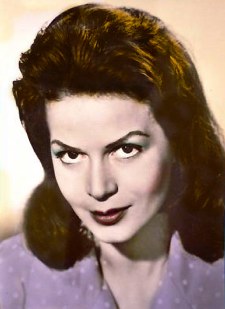 |
EVA BARTOK: a biography
Copyright 2013 Omar Martinez
Part 1: THE SCANDAL AND THE MIRACLE
In 1956, world-famous screen and stage actress Eva Bartok was in Hollywood working on a film and enjoying the fabulous California weather. Her prospects couldn't be better: she had reached "the golden Mecca" of the movie industry as a star. After years of work and fame in Europe, a major Hollywood studio was offering her, once more, a long-term contract, and the opportunity to become a household name in America. Within that year, certain events turned her "California dreaming" into a nightmare. First there was a minor scandal generated by a "nice American young man" she was dating who turned ballistic when his love feelings were not reciprocated. Eva's initial impression of the American press being fair and objective was demolished by the little incident.
Then there was the problem at the studio where her long-term contract came attached to an unwritten "casting couch" clause. Later that year, Eva and her mother, both Hungarian exiles, sat for hours in front of the radio and television transfixed by the horrendous news of a crushed revolt in their homeland. Soviet tanks -and world apathy- shattered Hungary's quest for freedom.
|
Soon after that, Eva Bartok would face a crisis of a more personal nature: she was diagnosed with ovarian cancer and she was pregnant. Fleeing alone to London, her dim prospects were confirmed by British physicians. She must submit to surgery at once to save her life but there was no hope for the baby growing alongside the tumor. The child she had always dreamed of was doomed...
To gage Eva's situation at this point, we have to consider a little bit of her background. She was 27 years old with four marriages and as many divorces under her belt. She was a controversial celebrity whom the world would soon learn was very ill and pregnant by an unknown individual without the benefit of marriage, a double whammy in the innocent, prurient 1950s. Furthermore, she refused to reveal the identity of her baby's father. Milder fare had previously destroyed the career of such beloved film star as Ingrid Bergman. But in Eva Bartok's case we encounter a woman committed to survival and, more important to her, survival of her baby. A woman who faced this crisis with integrity, faith and courage, rare traits in a glamorous movie queen.
Ultimately, the tumor disappeared and the "miraculous baby" was born in October of 1957, without a hitch. Of course there was widespread media attention, speculation and controversy which has lasted until today. But for Eva, the events of 1956-1957 were the reaffirmation of her beliefs and the answer to a lifelong quest for meaning.
|
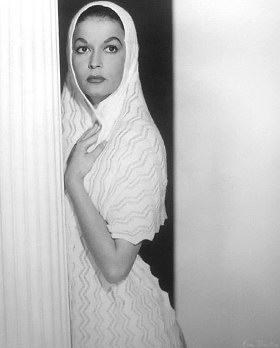 |
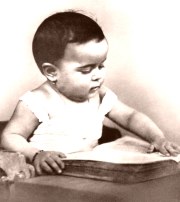 One year-old Eva poses with one of her father's books.
|
Part 2: GENESIS
Eva Bartok was born Eva Ivanova Szöke on June 18, 1929 in Budapest, Hungary of a Catholic mother and Jewish father. Her parents' marriage had caused quite an upheaval in both sides of the family and it is very possible that the father's side was never present during Eva's childhood and adolescence. The mother's side had reluctantly accepted the union since the father never interfered with Eva's Catholic upbringing. But, by all accounts, Eva's parents truly loved each other and they were both committed to their only daughter so it was an idyllic childhood for the future actress. She loved her mother dearly but she idolized her father, a handsome, intelligent man who made a decent living for the family as a writer of political issues and social commentary in Budapest newspapers.
These auspicious beginnings would eventually fade and Eva's life would be turned upside down, but for now, she was growing up, going to school and basking in all the attention her parents bestowed on her. Doted with a great imagination and intelligence beyond her years, she soon began to question her place in the universe and the meaning of everything that surrounded her. Little Eva also showed a born ability to create imaginary characters and situations, a gift that did not go unnoticed by her teachers.
|
She was barely 6 years old when she impressed everybody by reciting a poem in a school function.Her parents were encouraged to enroll their daughter in the Children's Repertory Company, a local performing arts school for talented children, but the father refused permission. He did not visualized his little princess as an actress, in his opinion an unreliable and dangerous profession for a woman. Although Eva loved acting instinctively and was disappointed, she abided by her father's wishes, thinking that her mother would persuade him later on.
Things began changing for Eva and her family at the same time that political insanity broke out in Europe courtesy of Nazism. As Hitler's influence grew, anti-Semitism showed its ugly face all over the continent. Eva's father denounced the situation in his writings but soon it became obvious that he was putting himself and his family in danger. Rather than betray his heritage, the father decided to distance himself from his beloved wife and daughter in an effort to save them. He sent them both to live in Kecskemét, south of Budapest, where his wife had relatives. He would visit them on Sundays and take Eva out to the local children venues.
For the girl these were the happiest times and she began living for the weekends when she would walk proudly all over town with her beloved father. In time those visits became less frequent until they stopped altogether. The mother made all kinds of excuses but Eva was smart enough to sense that something was terribly wrong. Eventually the father disappeared without a trace and his sacrifice would prove useless.
|
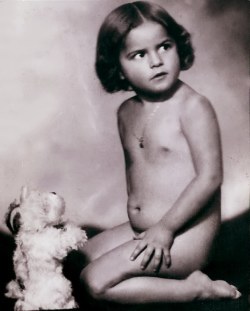 Undeniable star quality even at this stage.
|
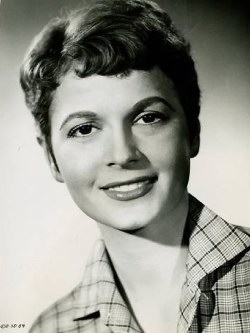 A youthful Eva could smile in spite of her sorrows.
|
Part 3: TO HELL AND BACK
During the years prior to the German occupation, Eva had blossomed into a beautiful teenager. She had continued attending school but, clearly, her mind was not in it. She longed for her father and felt an internal emptiness that was unexplainable but nevertheless real. At age 14 she met the first love of her life, the "prince charming" she thought she was looking for. He was a handsome and gentle Hungarian soldier named Erno who was staying with other soldiers in the house where Eva and her mother lived, since the government had requisitioned all homes as shelters for the military.
In spite of objections by Eva's mother, the romance developed and the two youngsters considered themselves fortunate to have found each other. However it did not last long since Erno was sent to the Russian front with the German Army. Eva never heard from him again, just as she never heard from her father. Meanwhile, the young lady was locally known as the "daughter of a Jew" and, as the Nazi occupation became a reality, she could not escape the possibility of being sent to a concentration camp. The invaders harassed Eva and her mother until a local Nazi official offered to help. His name was Geza Kovacs and he proposed marrying Eva in order to save her. Eva was only 15 at the time but the cruel reality was that either she married this odious military or face imprisonment, torture and a slow death as one more victim of the Holocaust.
The arranged marriage took place but it only proved a change of hell for Eva. The "honeymoon" was nothing but a series of ruthless rapes which made the teenager physically and emotionally sick. There were many days when she was unconscious and feverish and her mother could do nothing but comfort her despondent daughter who found her fate worth than martyrdom. The horrors of Nazism and the war were soon substituted by Communist tyranny. The Soviets "liberated" Hungary and then occupied it establishing a Marxist-Leninist dictatorship.
|
At the beginning it was a relief for Eva and her mother since the Nazi husband disappeared under the new regime and the marriage was officially annulled by the courts on grounds of "coercion of a minor." Later they realized that the new rulers were as cruel and terrifying as the old Gestapo. The communists not only wanted submission of the body but ownership of the soul as well.
With the war over, Eva started looking at her bleak future. She was in many ways a young woman marked forever by the horrors of man's cruelty to man but, at the same time, she knew she had to go on. She moved with her mother and a young cousin named Andrew back to Budapest to a one room flat in the midst of utter destruction. The city that had once been so beautiful and gay was now torn and wounded. Eva needed money desperately to support her little family and the prospects were dim for a young lady with no skills. There was no time to go back to school and finish her education so she turned to her old dream: acting. She knew she had talent since that school performance when she was 6 and she had never lost an opportunity to perform in charity events and for wounded soldiers . However, in order to earn a living as an actress she was required to pass an examination by professionals at the Drama Centre. Though terrified, Eva went through the test and passed with flying colors. One of the examiners was the director of the Belvàrosi Szinhàz, one of the best theaters in town, and he offered her a three-year contract. She accepted immediately and always remembered that moment among "the happiest of her life."
A couple of months later, Eva Szöke made her professional debut in Priestley's "Time and The Conways" playing the part of Carol, a 14-year-old girl full of life and great expectations for the future who was to die at 16. The role demanded a long monologue in which the doomed girl expresses her longing for living and happiness. Eva cried as she uttered the words and so did the audience. A standing ovation followed. In the morning, the newspapers reported that a new talent had appeared on the Budapest stage. All drama critics agreed that the newcomer was simply sensational and Eva's reputation grew with each performance.
|
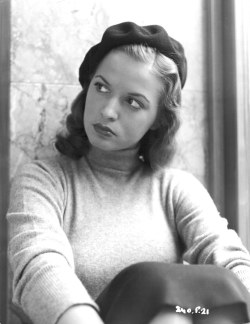 Early Eva
|

